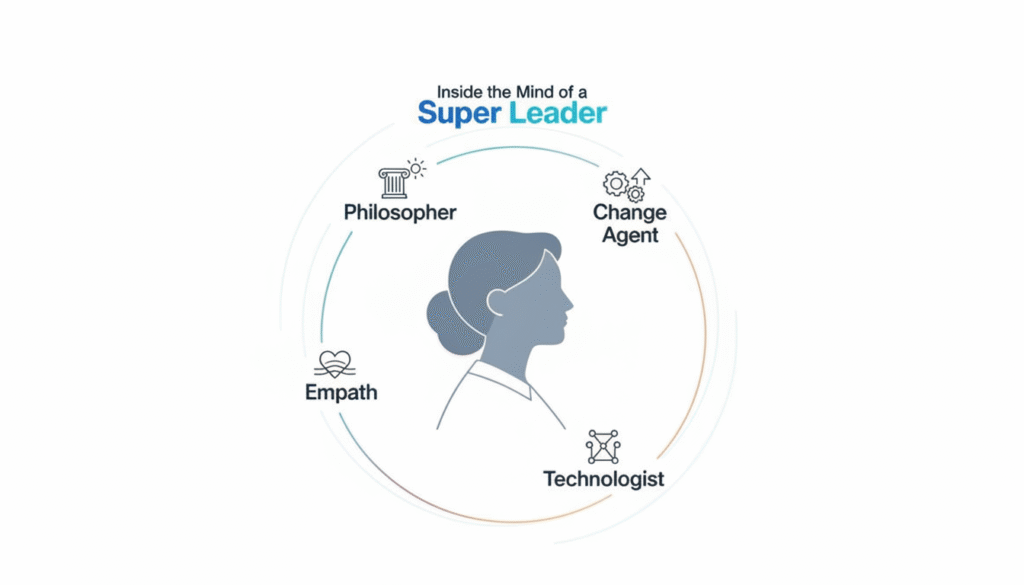
Great leadership has never been a simple pursuit. But in the age of technology, leadership itself is being rewritten — not in theory, but in real time.
Kelly Jones, Cisco’s Chief People Officer, recently reflected on this very transformation in her Newsweek article “The Era Demands a New Kind of Leader.” Her message is clear: as technology becomes an inseparable part of work, the leaders who will thrive are those who can stay deeply human while mastering it.
When AI Makes You a Better Human
Jones shared a candid moment from her own experience — one that captures the essence of this shift.
Before a difficult conversation with a high-performing team member facing personal struggles, she turned to AI for help. Not to write the message for her, but to refine it — to make her words clearer, more thoughtful, and more empathetic.
That experience, she says, reinforced a belief she holds deeply:
“The leaders who will succeed in the AI era are those who are technically savvy but also remain deeply human.”
And that, she says, is why the world needs a new kind of leader — a “Super Leader,” who can blend emotional intelligence with technological fluency.
Work Is Changing — And So Must Leadership
The pace of adoption is breathtaking. According to Cisco’s 2024 Readiness Index, 85% of global business leaders believe they have less than 18 months to execute a strategy or risk falling behind. Yet, only one in seven companies feels fully prepared to deploy it at scale.
This gap, Jones argues, isn’t just a technical one — it’s a leadership challenge.
Employees today aren’t just looking for strategies and roadmaps; they’re looking for reassurance. They need leaders who can guide them through uncertainty and balance innovation with empathy.
That’s where the “Super Leaders” come in.

The Four Personas of a Super Leader
Jones breaks down this idea into four powerful personas that define leadership in the AI age — not as job titles, but as mindsets:
- The Technologist: Harnesses AI to drive innovation, efficiency, and real-world value.
- The Empath: Cultivates psychological safety, open communication, and inclusion.
- The Philosopher: Grounds every decision in ethics, purpose, and long-term impact.
- The Change Agent: Embraces uncertainty and guides teams with resilience.
Jones herself relates most to the Philosopher:
“In times of change, values are our anchor. The best leaders question assumptions, reimagine progress, and always keep humanity at their core.”
At Cisco, she adds, leadership development isn’t left to chance — it’s nurtured through structured training, real-world practice, and the intentional building of these capabilities.
Practicing Super Leadership at Cisco
Technology, for Jones, is not just a futuristic concept — it’s a daily companion.
She uses it as a “strategic coach,” outlining complex problems and asking AI to challenge her assumptions. She even employs AI to prepare for sensitive conversations — analyzing communication styles, relationships, or even personality frameworks like Myers-Briggs.
The result? Clearer, more compassionate leadership.
At Cisco, this approach is scaling beyond her office. The company is designing AI tools that guide leaders through critical moments — whether it’s preparing for performance conversations or reflecting on their leadership style.
Technology, in Jones’ view, isn’t replacing the leader — it’s refining the leader’s humanity.
Super Leaders Embrace Emerging Technology
What makes the Super Leader truly stand out is their ability to use emerging technology not just to grow themselves — but to help others grow, too.
Cisco is developing an internal AI assistant that helps leaders engage more effectively, reflect on decisions, and align with the company’s guiding principles. The company’s learning platform even uses AI to personalize growth recommendations — combining feedback with skills data to generate curated micro-learning opportunities for employees.
There’s even more innovation ahead: immersive AI-powered VR simulations that help leaders practice real-world scenarios in a safe, adaptive environment.
As Jones puts it, the goal is simple:
“Super Leaders not only embrace emerging technology but leverage it for both their own growth as well as the growth of their team.”
Centering Wellness for Effective Leadership
But even as AI reshapes the workplace, Jones warns that human-centered qualities — empathy, ethics, adaptability, and communication — remain the foundation of enduring leadership.
Company’s research shows that over 91% of ICT roles will be transformed by technology, with leadership and management among the most affected. That’s why Cisco is prioritizing leader wellness — investing in programs that combine technology and self-awareness.
From personalized wellness plans powered by wearable data to lifestyle coaching and “whole leader” assessments, the company is ensuring leaders stay grounded in their well-being.
Because when leaders invest in themselves, they lead with greater clarity — and make their teams more human, connected, and inspired.
Leading with Empathy in the AI Age
Transformation, Jones reminds us, is not just about new tools — it’s about how we choose to use them.
Change fatigue is real. The true challenge for leaders today is to bring empathy, trust, and purpose into the digital transformation journey.
As Jones beautifully writes,
“Super Leaders use technology to bring clarity, not complexity. To empower, not overwhelm. To build workplaces that are not just more efficient, but more human.”
At Cisco — and increasingly across industries — the next generation of leadership will be rooted in purpose, powered by innovation, and led with intention.
And that’s the leadership the AI era demands.
And that’s the leadership the AI era demands.

